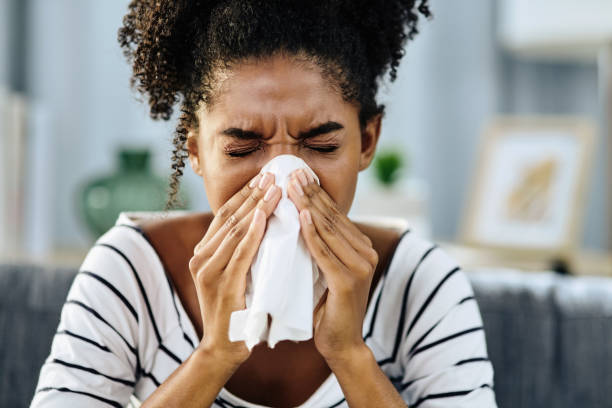Its Allergy Awareness Week in the UK, with a national charity calling for improvements to allergy services at primary care level.
 Running from 24th to 30th April 2023, Allergy Awareness Week was established by Allergy UK to help raise the profile of allergy at all levels.
Running from 24th to 30th April 2023, Allergy Awareness Week was established by Allergy UK to help raise the profile of allergy at all levels.
Over 20 million people in the UK have an allergic condition, and 50% of children are affected by one or more allergies. Despite this, there remains an imbalance across the nation between patient needs and the provision of allergy services.
Call for specialist allergy services
That’s why, this year, Allergy UK is asking people to pledge support for their Patient Charter, which is calling for better allergy support from primary care services.
 It follows research by the charity which found that nearly two thirds (65%) of respondents from within the allergic community want access to specialist allergy nurses in GP surgeries. Meanwhile, more than 6 in 10 respondents (61%) want the government to do more to help people with allergies.
It follows research by the charity which found that nearly two thirds (65%) of respondents from within the allergic community want access to specialist allergy nurses in GP surgeries. Meanwhile, more than 6 in 10 respondents (61%) want the government to do more to help people with allergies.
In England, Integrated Care Boards (ICBs) are the NHS organisation responsible for developing service plans for their local area to meet the health needs of the community. It is their responsibility to commission allergy services.
Around 8% of GP visits are related to allergies. Allergy UK says that, if each NHS Integrated Care Board, or equivalent, in the UK had at least one specialist allergy nurse and dietitian within its region, people living with allergies would have better access to quality care, advice and support in a timely manner.
That’s why the charity is using this year’s Allergy Awareness Week to launch their call, which they say is central to the Right to Quality Care, as laid out in their Patient Charter.
They want each ICB to introduce a fully funded specialist allergy service with a specialist allergy nurse and one specialist dietician. They are urging members of the allergic community and others to pledge their support for this call.
This Allergy Awareness Week, they want people to:
- Pledge their support
- Contact their local politician to help raise awareness within government
- Raise awareness by sharing their own experiences or voicing their support on social media or other forums
On their website, Allergy UK has provided template letters that people can send to their local MP as well as suggested social media posts, an updated overview of the state of provision for allergy services in the UK and more information about this specific campaign and their Patient Charter in general.
Patient Charter for better allergy services
The Patient Charter was launched in 2022 to highlight the challenges faced by the allergic community.
Allergy UK says that people living with allergies can struggle to access high quality care. The Patient Charter is designed to give this community a voice and to outline the ‘Gold Standard’ of patient rights as defined by the community and leading clinicians.
The Charter sets out:
- The Right to a Quality Standard of Care for everyone with an allergy throughout the UK
- The Right to Education – patients with allergic conditions should be empowered to understand and manage their conditions with support from informed healthcare professionals
- The Right to Equality through better awareness and understanding of allergy to prevent discrimination against people with allergies
This Allergy Awareness Week, the campaign is focusing specifically on the Right to a Quality Standard of Care.
Allergy UK says their evidence suggests that the introduction of a specialist allergy nurse and a dietitian as part of GP services in the UK would improve healthcare outcomes for people with allergies.
Equitable treatment for allergy sufferers
 The charity says that many people with allergic conditions can feel that society dismisses their condition and disregards their needs. This is despite the fact that hospital admissions due to allergies have risen by 52.5% in the last 6 years. There have also been 29% more hospital admissions for anaphylaxis, a severe and potentially life-threatening reaction that can develop rapidly.
The charity says that many people with allergic conditions can feel that society dismisses their condition and disregards their needs. This is despite the fact that hospital admissions due to allergies have risen by 52.5% in the last 6 years. There have also been 29% more hospital admissions for anaphylaxis, a severe and potentially life-threatening reaction that can develop rapidly.
As a result, people living with severe allergies can experience anxiety, stress and a mental health burden linked to their condition.
Children and young people with allergies may also experience isolation and bullying as well as the fact that a poorly controlled allergy can potentially negatively impact their educational attainment and subsequent job opportunities.
Allergy UK supports the allergic community with information, guidance, a dietitian service, helpline, allergy alerts and translation cards for navigating allergies during overseas travel.
Allergy education and training
First Response Training (FRT) is a leading, national training provider. They deliver over 7,000 courses each year in the fields of health and safety, first aid, fire safety, food safety, mental health, health and social care and other special focus topics.
Their portfolio includes the Level 2 Award in Anaphylaxis and Emergency Medication as well as training in Inhalers and Nebulisers.
Common signs and symptoms of allergic reactions can include:
- Sneezing and/or an itchy, runny or blocked nose
- Itchy, red or watering eyes
- Shortness of breath, wheezing, tightness in the chest and/or a cough
- Raised, itchy red rash
- Swollen lips, tongue, eyes or face
- Nausea
- Worsening of asthma or eczema symptoms for those who have these conditions
Signs and symptoms of anaphylaxis may include:
- Difficulty breathing or speaking
- Coughing or wheezing
- Feeling faint, lightheaded or dizzy
- Abdominal pain, nausea and vomiting
- Loss of consciousness
Anaphylaxis is a medical emergency; you must always call an ambulance if you suspect someone is experiencing anaphylactic shock.
Some of the most common allergens include:
- Grass and tree pollen (an allergy to these is known as hayfever)
- Dust mites
- Animal skin or hair
- Food – common food allergens include nuts, shellfish, eggs, cow’s milk, gluten, soy or types of fruit
- Insect bites and stings
- Medication, such as ibuprofen, aspirin and certain antibiotics
- Latex
- Mould
- Household chemicals, such as those found in detergents
If you live with an allergic condition or are supporting or caring for someone with an allergy, you may need to consider the following useful tips for helping to manage allergies:
- Practice good housekeeping by keeping your environment clean and tidy. This is particularly important for people who suffer with mould and dust mite allergies
- Use an air purifier to reduce any airborne allergens
- Ensure you have stock of relevant emergency medication where appropriate and that you are aware of how to use it correctly. Schools are able to keep stock of spare adrenaline auto-injectors to use in emergency situations without the need for a specific prescription for a specific child. If you work in a school, make sure you are aware of the guidance. For milder allergic reactions, antihistamines may help. Always consult a pharmacist and read the package instructions and guidance
- When preparing food, ensure you ask other diners if they have any food allergies or intolerances. If someone does have a food allergy, you must ensure the allergen is not present in the food and that equipment used to make the food does not come into contact with the allergen. For some severe food allergies, even being in the same room as the allergen can trigger a reaction
- Provide emotional support for people living with allergic conditions, as many will experience anxiety and stress linked to their allergy. You can help to alleviate anxiety by providing a safe environment and you can also practice positive strategies for managing anxiety, such as mindful breathing or muscle relaxation
If you suspect you or someone you care for may have an allergy, you should contact your GP in the first instance. You can find out more information about allergies on the NHS website.
A trainer from FRT says:
“Allergies can be very serious and can impact every aspect of a person’s life.
“It is therefore very important that people have an awareness of allergies and the signs and symptoms of an allergic reaction. Training and information are particularly important for those who are responsible for taking care of others, whether adults or children. Prompt action is vital when someone has a severe allergic reaction.
“We support Allergy Awareness Week and Allergy UK’s Patient Charter and their calls for improved allergy services and support for people living with allergic conditions.”
For more information about the training available, please call FRT today on freephone 0800 310 2300 or e-mail info@firstresponsetraining.com.
